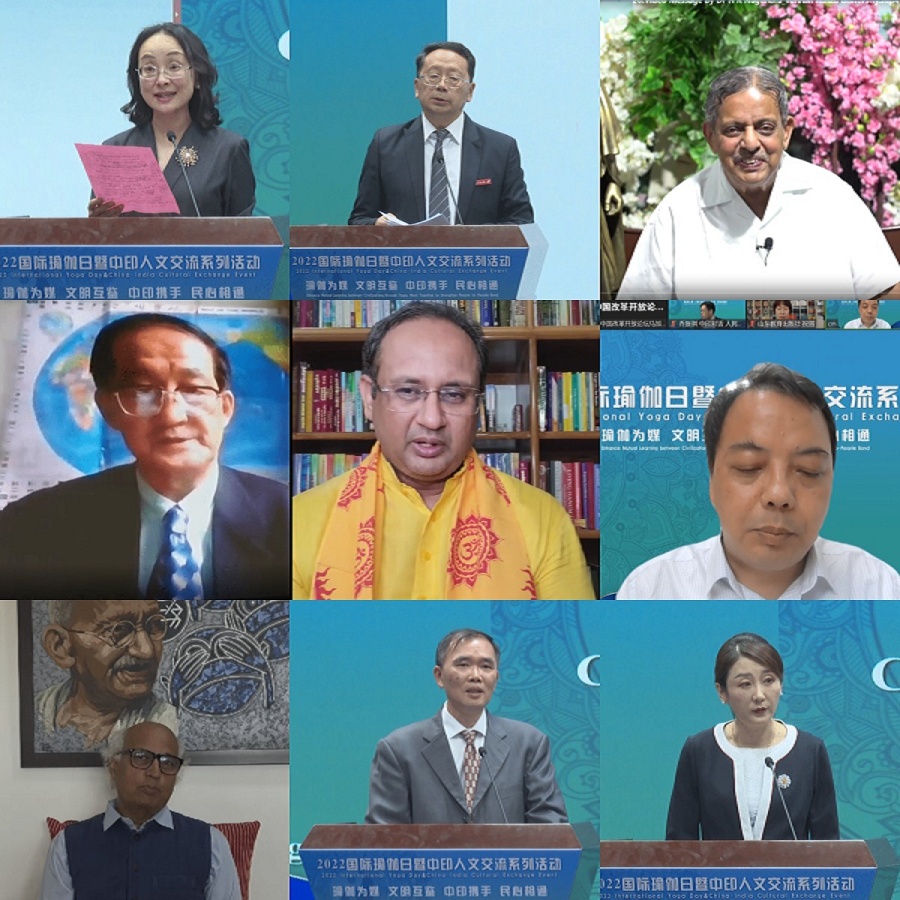China-India Cultural Exchange Forum Held in Kunming

The 2022 International Yoga Day & China-India Cultural Exchange Event took place in Kunming, capital of southwestern China’s Yunnan Province, on June 21. Themed “Enhance Mutual Learning between Civilizations through Yoga, Work Together to Strengthen People-to-People Bond,” the event included a China-India Cultural Exchange Forum featuring participation from more than 50 scholars and experts, both in-person and virtually.
Duan Gang, vice president of Yunnan Minzu University (YMU), is well aware of the opportunities and challenges the yoga industry in China is facing. He suggested a better management structure through refining yoga industry standards, training yoga professionals, organizing yoga competitions, carrying out research on yoga, and improving industry management of fitness yoga.
Dr. H. R. Nagendra, president of Vivekananda Yoga Anusandhana Samsthana and vice president of the Indian Yoga Association, stressed that the objective of yoga is to bring everyone together and all countries into a single world family of love, affection, harmony, peace, and health. He also recognized YMU’s role in spreading a message of unity and cooperation particularly in the yogic dimension in India and China and enhancing cultural communication between the two countries.
Ma Jiali, director of the Center for Strategic Studies under China Reform Forum, said that both China and India face the historic mission of growing the economy and improving people’s livelihood. He expressed hope that China and India would sincerely communicate, cooperate, and jointly promote people-to-people and cultural exchanges to realize their national dreams and contribute to the progress and prosperity of Asia and beyond.
Dr. Chinmay Pandya, pro vice chancellor of Dev Sanskriti Vishwavidyalaya University and chairperson of the International Festival of Yoga, said that humans are witnessing a scene of inner chaos, confusion, dissatisfaction, fear, and disillusionment. Instead of external solutions, humans need to look within and seek transformation of consciousness, which is central to any yogic adventure. “Real yoga offers sense, direction, purpose, and meaning to life.”
Chen Ming, dean of the School of Foreign Languages and director of the Research Center of Eastern Literature at Peking University, suggested that China and India cannot be decoupled from any point of view. Chinese scholars should gain in-depth understanding of India’s history and culture, learn from their Indian counterparts, and jointly create a bright future for China-India people-to-people and cultural exchanges based on the spirit of equality, mutual learning, and common development.
Sudheendra Kulkarni, former chairman of the Observer Research Foundation (Mumbai) and founder and chairman of the Forum for a New South Asia, said that a combination of physical, mental, emotional, and spiritual health produces harmony and peace both within a human being and throughout society. He noted that Tai Chi has not become as popular in India as yoga has in China. He called on Indians to help make Tai Chi popular in their country. “This kind of people-to-people contact is the best thing India can offer to China and vice versa in terms of bringing our two great nations closer.”
Chen Lijun, vice president of the Yunnan Academy of Social Sciences, noted that traditional Chinese medicine and Indian Vedic medicine are iconic cultural systems in their respective country and that both have much to offer to the pharmaceutical industry. He suggested strengthening exchange and cooperation in the fields of medical culture and pharmaceutics to promote common development.
Zhang Wei, Party Secretary of the India-China Yoga College at YMU, expressed gratitude to all participants. She said that the college sought to actively absorb and apply insight from all the experts and scholars and implement consensus reached by the leaders of China and India on promoting people-to-people contact and cultural exchange between the two countries.
Under the guidance of China International Communications Group (CICG), the Foreign Affairs Office of Yunnan Provincial People’s Government, and the Publicity Office of Yunnan Provincial People’s Government, the 2022 International Yoga Day & China-India Cultural Exchange Event was hosted by YMU, the Publicity Department of the Kunming Municipal Party Committee and the CICG Center for Europe and Asia (China Pictorial Publications), and organized by the India-China Yoga College of YMU, China India Dialogue, and the Yunnan International Communication Center for South & Southeast Asia.
